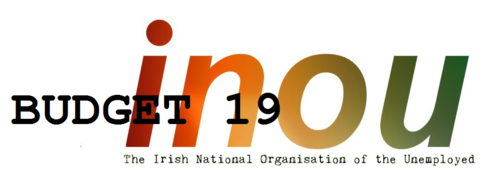This article will look at Budget 2019 under the five themes of the INOU’s pre-Budget submission: adequate income; supportive employment services; access to decent employment; education and training; and community based organisations. In Issues 33 and 34 of the INOU’s e-bulletin the organisation’s key Budget 2019 asks were highlighted and discussed.
Adequate Income
In March 2019 the main Social Welfare payments will be increased by €5. This will bring working age payments almost back to 2009 levels. However, this is the year when age segregation was introduced to the Jobseeker’s Allowance, initially for 18 and 19 year olds, but now applies to 18-24 year olds, with another rate for 25 year olds.
The Christmas Bonus in 2018 will be paid at 100% of normal weekly payments for eligible Social Welfare recipients. However, to receive this bonus unemployed people must be on a Jobseeker’s payment for at least 15 months.
The Qualified Child Increase will also be increased, but will now have two age groups. So for under 12 years the payment will increase from €31.80 to €34; and for children aged over 12 years it will increase from €31.80 to €37.
There will be a €25 increase in the Back to School Clothing and Footwear Allowance for each qualifying child.
The Daily Expenses Allowance (formerly Direct Provision Allowance) to increase to €38.80 for adults and to €29.80 per week for children.
The weekly Fuel Allowance remains at €22.50, but will be available for 28 weeks in 2019.
It is envisaged that the self-employed will become eligible for Jobseeker’s Benefit from Quarter 4, 2019, though how this will be paid for has yet to be identified.
Supportive Employment Services
There was very little new under this heading. There will be additional funding under the cross-border PEACE Programme 2014-2020, and the 2019 allocation will be €5m. For unemployed people and other welfare recipients eligible for the Back to Work Family Dividend, the increase in the Qualified Child Increase will benefit them.
Access to Decent Employment
There was one change made to the Working Family Payment: eligible recipients will benefit from a new maintenance disregard of €95 per week in respect of housing costs; and the remainder will be assessed at 50%.
There was nothing on the Living Wage, but the National Minimum Wage will increase to €9.80 from January 2019; the second USC rate band ceiling will increase from €19,372 to €19,874; and the weekly threshold for the higher rate of employer’s PRSI G from €376 to €386.
The earnings disregard for working lone parents receiving One-Parent Family Payment or Jobseeker’s Transition Payment to increase by €20 to €150 per week.
Education and Training
There was nothing new in Budget 2019 on advice and guidance or the cost of participation. Under the Department of Education and Skills, through a reformed National Training Fund (NTF), there will be an additional 1,200 craft and earn as you learn places; 1,100 Traineeships; 7,400 Skillnets Ireland places; and 1,000 Springboard places.
There will be a new ring-fenced funding line of €300m entitled the Human Capital Initiative which will focus on Higher Education, QQI Levels 6 - 8.
In Budget 2019 the Exchequer will fund an additional €57 million in investment in programmes with significant activity below level 5 on the NFQ, which had previously been resourced through the National Training Fund.
Community Based Organisations
For many community based organisations, Community Employment is a key resource for the maintenance and development of their work, and to that end the announcement that there will be an additional €2m for materials funding is a welcome development.
The Department of Rural and Community Development in their post Budget press statement noted that there will be:
- Labour market training and supports through the Social Inclusion and Community Activation Programme: €43m
- Support for a range of initiatives in the community and voluntary sector: €12.7m
- Consolidate RAPID and Community Facilities Scheme into the Community Enhancement Programme: €4m
- CLÁR Programme: €5m
- Continue to support Social Enterprise under the Community Services Programme: €46m
- Dormant Accounts Action Plan which address economic, social or educational disadvantage: €12.6 m
Public Estimates
On Budget day Estimates for Public Services is also published which gives initial information on expenditure for the following year. More detailed information is contained in the Revised Book of Estimates usually published on the Department of Public Expenditure and Reform’s website in December.
The following table shows the level of expenditure, and estimated expenditure over the period 2016-2019 for a range of employment supports and programmes.
Employment Supports | 2016 €m | 2017 €m | 2018 €m | 2019 €m |
Back to Work Enterprise Allowance | 124.37 | 115.8 | 101.68 | 70.36 |
TUS | 122.7 | 108.0 | 100.1 | 95.0 |
JobBridge | 37.08 | 15.0 | 1.0 | - |
Youth Employment Support Scheme | - | - | 1.0 | 5.0 |
Community Employment | 355.0 | 353.0 | 350.03 | 345.115 |
Gateway | 21.52 | 3.4 | 0.47 | - |
Rural Social Scheme | 44.33 | 45.5 | 51.045 | 53.115 |
Community Services Programme | 45.19 | 46.19 | 46.19 | 46 |
Jobs Initiative | 20.41 | 19.27 | 18.52 | 17.49 |
Back to Education Allowance | 116.49 | 96.0 | 72.95 | 61.67 |
Back to Work Family Dividend | 28.72 | 24.5 | 20.74 | 21.27 |
JobsPlus | 23.9 | 30.0 | 30.0 | 20.2 |
Local Employment Service | ↓ | ↓ | 19.3 | 19.3 |
Jobs Clubs | ↓ | ↓ | 5.4 | 5.4 |
Other Working Employment Supports | 47.91 | 42.55 | 12.04 | 9.62 |
Social Inclusion and Community Activation Programme | 42.455 | 42.23 | 43.23 | 43 |
Wage Subsidy Scheme | 21.93 | 20.8 | 23.16 | 24.72 |
